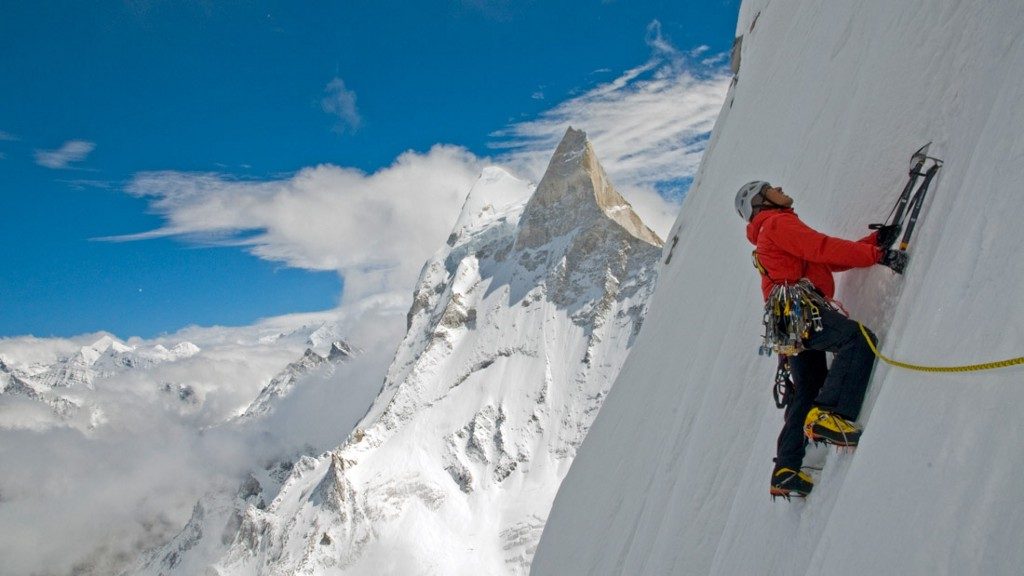(Elizabeth) Chai Vasarhelyi is an award-winning film director and producer with Hungarian, Chinese, and Brazilian roots. Her first film, A Normal Life, about young Kosovars who came of age during the recent war, won Best Documentary at the Tribeca Film Festival in 2003. Her second film, Youssou N’Dour: I Bring What I Love, which chronicles Senegalese icon Youssou N’Dour and his Grammy Award-winning album Egypt, was released in theaters in the US and internationally. The film won numerous awards, including the Special Jury Prize at the Middle East International Film Festival in 2008 and a nomination for the Pare Lorentz Award at the 2009 International Documentary Association Awards. (Vasarhelyi’s official site)
Meru will premiere at the 2015 Sundance Film Festival on January 23.
W&H: Please give us your description of the film playing.
CV: Three elite mountain climbers sacrifice everything but their friendship as they struggle through heartbreaking loss and nature’s harshest elements to attempt the never-before-completed Shark’s Fin on Mount Meru, the most coveted first ascent in the dangerous game of Himalayan big-wall climbing.
W&H: What drew you to this story?
CV: I joined Meru midstream after my co-director Jimmy Chin had already filmed the 2008 and 2011 climbs. As a documentary filmmaker, Meru was an irresistible challenge. You can spend years searching for the right story, but this one had all the elements: the obstacles, the characters, and the drama.
The cinematography and the conditions in which Meru was filmed drew me to the project. It’s remarkable to think that everything in the film is real; these three men set out to attempt this impossible climb and to film it at the same time. I thought it was an incredible achievement and I saw how I could contribute by working on the structure and interviewing the climbers to get them to open up about their experiences. I understood what Jimmy, Conrad, and Renan were saying about how the risk was part of pursuing their hearts’ passion in the mountains — but also how this could seem foreign to others.
When I joined the film, my role as a filmmaker and a non-climber was to lend objectivity in order to bring to life the best possible story. These guys feel the need to pursue these challenges to be able to live. I was also interested in what the female characters in the story had to say and how they lived with the risks these climbers were taking as part of their professional careers. I was interested in this tension and somehow bringing to light what is a universal story with real life-and-death stakes.
W&H: What was the biggest challenge in making the film?
CV: The challenges of filming in the high-altitude mountain conditions on Meru were extreme. The mantra was always “Don’t drop the camera!” Off the mountain, putting together the narrative, we were faced with the challenge of balancing the sheer scale and danger of the climb itself with bringing to life the personal choices and subtle complexities of the characters. Their actions may appear extreme, but we wanted audiences to understand the many personal decisions involved. At its heart, Meru is a personal story.
W&H: What do you want people to think about when they are leaving the theatre?
CV: We hope the film’s story about struggling to achieve one’s dreams will inspire, but we also want people to think about the delicate balance between ambition, loyalty, family, and friendship. Of course, we’d love audiences to walk away with a visceral experience of cutting-edge climbing in the big mountains and gain an understanding of the stakes, risks, and sacrifices involved in a being a professional mountain climber.
W&H: What advice do you have for other female directors?
CV: I gave birth to a daughter 16 months ago, and I’ve been thinking a lot about how to balance the time I enjoy raising my child with the demands of an active creative career. This was especially true during the run-up to Sundance! I think the best piece of advice I received that I would like to share with other female directors is that among the most nurturing things I can provide for my daughter is to help her one day find what she’s best at, and that the way to do that is to let her see me pursue my dreams and ultimately excel in what I’m best at. This doesn’t solve the issue that I’m exhausted all the time, but show me a filmmaker who isn’t! I also think that seeking the advice and company of a community of professional women really helps.
W&H: What’s the biggest misconception about you and your work?
CV: Given the themes of this interview, I’ll talk about how there’s always a bit of misunderstanding around my name. My full name is Elizabeth Chai Vasarhelyi. My friends call me by my middle name, Chai, but when I didn’t include the Elizabeth in film credits, people would just assume I was a man. I’d prefer people understand a woman directed my films, so now I include Elizabeth, but you can call me Chai.
W&H: How did you get your film funded?
CV: I think it’s really important to involve financiers in the process and to invest in those relationships. That was the case with Meru, which was financed by a group of private investors who believed in our story and were a constant source of support and advice throughout the process.
W&H: Name your favorite woman-directed film and why.
CV: I first saw Julie Taymor’s Titus when I was in college. Taymor’s use of imagery, borrowed from Bernini’s sculptures illustrating the parables in Ovid’s Metamorphoses, still haunt me. In terms of documentaries, there are so many good films directed by women. One of my favorites remains Jenny Livingston’s Paris is Burning in terms of her ability to humanize a marginalized subculture in NYC with so much dignity and fun.







